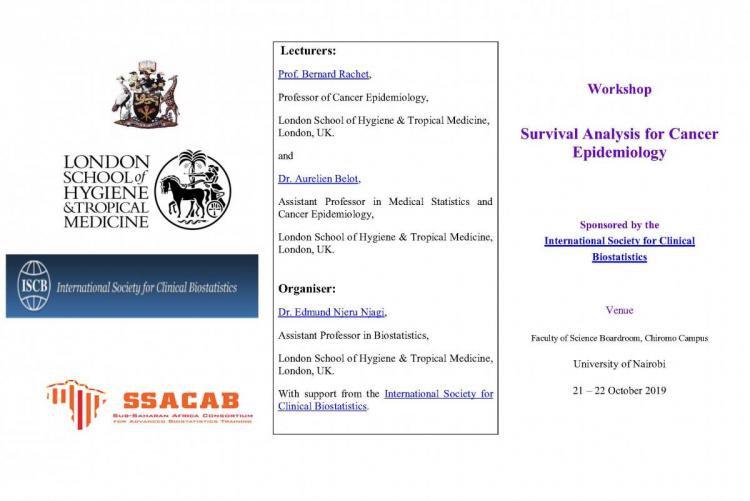Faculty of Science Boardroom, Chiromo Campus, University of Nairobi
Faculty of Science Boardroom, Chiromo Campus, University of Nairobi
Introduction
Statistical analysis of routinely collected population-based cancer survival data is crucial in guiding policy-makers on priority investments in cancer services. With the epidemiological shift in low and middle-income countries to chronic diseases such as cancer, there is a need for biostatisticians in public health to gain expertise in the analysis of such data. Analysis of population-based cancer survival data is more complex than survival analysis in other settings, as there is the additional and unique challenge of unreliability or even complete unavailability of the cause of death. A whole range of special survival analysis techniques, namely net survival methods and excess hazard models, have therefore been developed to analyse such data, and derive quantities of interest to patients, clinicians and policy-makers. This workshop will provide training on both the theory and application of these methods. We will introduce participants to population-based cancer survival research and highlight its importance for policy. The distinction between this setting and the classical survival setting will be elucidated. Finally, we will zoom in on the specific techniques for population-based cancer survival analysis and demonstrate these in the freely-available R software.
Objectives
By the end of this workshop, participants will be able to:
- Appreciate the role of population-based cancer survival research in informing policy
- Distinguish between the classical survival analysis and the population-based cancer survival analysis setting
- Apply non-parametric net survival methods and interpret results
- Formulate, estimate and interpret excess hazard models
- Content
- We will cover the following topics:
- Introduction to the relative survival data setting
- Net survival and other measures of interest: assumptions, estimation and interpretation
- Excess hazard modelling: overview and existing approaches
- Flexible modelling: time-dependent and non-linear effects
Sessions will be followed by practical sessions in R software, where population-based cancer survival data will be analysed to answer medical research questions of interest. - Lecturers:
Prof. Bernard Rachet,
Professor of Cancer Epidemiology,
London School of Hygiene & Tropical Medicine, London, UK.
Dr Aurelien Belot,
Assistant Professor in Medical Statistics and Cancer Epidemiology,
London School of Hygiene & Tropical Medicine, London, UK.
Organiser:
Dr Edmund Njeru Njagi,
Assistant Professor in Biostatistics,
London School of Hygiene & Tropical Medicine, London, UK.
With support from the International Society for Clinical Biostatistics.
Required knowledge
Basic knowledge of survival analysis and R software is advisable. The requisite elements of these two components will, however, be briefly reviewed during the workshop.
Hardware and Software
Participants are expected to bring their own laptops.
Statistical analyses in this workshop will be illustrated in R statistical software. R is available as Free Software and runs under Windows and Macintosh. It can be downloaded at https://cran.rproject.org/.
It is recommended that participants install the software beforehand.
Registration Contacts:
School of Mathematics, University of Nairobi
Tel: +254-725-878750, + 254-704-315332, and +254-780-834766
E-mail: maths@uonbi.ac.ke, rsarguta@uonbi.ac.ke, and onyango@uonbi.ac.ke
Registration
Registration is mandatory: click here to register
The registration fee is KES 3,000 for both local and international participants.
Members of the International Society for Clinical Biostatistics, and East Africa students, will be eligible for a 10% discount.
M-PESA number: +254725878750; receiver’s name is Dr Rachel Sarguta.
Registration is finalized once the fee is received.
Registration Deadline: 30 September 2019
The number of participants is limited, and therefore early registration is recommended. The course may be cancelled (with a month’s notice) in case of insufficient booking.

